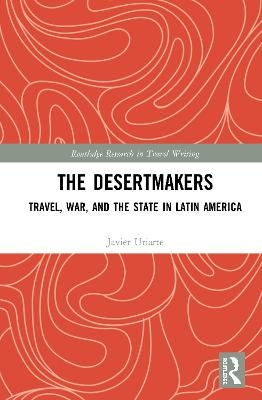
The Desertmakers
Travel, War, and the State in Latin America
Seiten
2019
Routledge (Verlag)
978-1-138-66892-8 (ISBN)
Routledge (Verlag)
978-1-138-66892-8 (ISBN)
This book studies how the rhetoric of travel introduces conceptualizations of space and time in scenarios of war during the late 19th century, in Argentina, Brazil, Paraguay, and Uruguay..
This book studies how the rhetoric of travel introduces different conceptualizations of space and time in scenarios of war during the last decades of the 19th century, in Argentina, Brazil, Paraguay, and Uruguay. By examining accounts of war and travel in the context of the consolidation of state apparatuses in these countries, Uriarte underlines the essential role that war (in connection to empire and capital) has played in the Latin American process of modernization and state formation. In this book, the analysis of British and Latin American travel narratives proves particularly productive in reading the ways in which national spaces are reconfigured, reimagined, and reappropriated by the state apparatus. War turns out to be a central instrument not just for making possible this logic of appropriation, but also for bringing temporal notions such as modernization and progress to spaces that were described — albeit problematically — as being outside of history. The book argues that wars waged against "deserts" (as Patagonia, the sertão, Paraguay, and the Uruguayan countryside were described and imagined) were in fact means of generating empty spaces, real voids that were the condition for new foundations. The study of travel writing is an essential tool for understanding the transformations of space brought by war, and for analyzing in detail the forms and connotations of movement in connection to violence. Uriarte pays particular attention to the effects that witnessing war had on the traveler’s identity and on the relation that is established with the oikos or point of departure of their own voyage. Written at the intersection of literary analysis, critical geography, political science, and history, this book will be of interest to those studying Latin American literature, Travel Writing, and neocolonialism and Empire writing.
This book studies how the rhetoric of travel introduces different conceptualizations of space and time in scenarios of war during the last decades of the 19th century, in Argentina, Brazil, Paraguay, and Uruguay. By examining accounts of war and travel in the context of the consolidation of state apparatuses in these countries, Uriarte underlines the essential role that war (in connection to empire and capital) has played in the Latin American process of modernization and state formation. In this book, the analysis of British and Latin American travel narratives proves particularly productive in reading the ways in which national spaces are reconfigured, reimagined, and reappropriated by the state apparatus. War turns out to be a central instrument not just for making possible this logic of appropriation, but also for bringing temporal notions such as modernization and progress to spaces that were described — albeit problematically — as being outside of history. The book argues that wars waged against "deserts" (as Patagonia, the sertão, Paraguay, and the Uruguayan countryside were described and imagined) were in fact means of generating empty spaces, real voids that were the condition for new foundations. The study of travel writing is an essential tool for understanding the transformations of space brought by war, and for analyzing in detail the forms and connotations of movement in connection to violence. Uriarte pays particular attention to the effects that witnessing war had on the traveler’s identity and on the relation that is established with the oikos or point of departure of their own voyage. Written at the intersection of literary analysis, critical geography, political science, and history, this book will be of interest to those studying Latin American literature, Travel Writing, and neocolonialism and Empire writing.
Javier Uriarte is Associate Professor in the Department of Hispanic Languages and Literature, Stony Brook University, USA
List of Figures
A Note on Translations
Acknowledgments
Introduction: The Desertmakers
1 War in Terra Incognita: Richard Burton’s Letters from the Battle-Fields of Paraguay
2 In Praise of Deviation: W. H. Hudson’s The Purple Land
3 Making Museums, Making Deserts: Francisco Moreno in Patagonia
4 The Limits of Visibility and Knowledge: Euclides da Cunha’s Os sertões
Afterword: What Is Left?
Bibliography
Index
| Erscheinungsdatum | 12.07.2017 |
|---|---|
| Reihe/Serie | Routledge Research in Travel Writing |
| Zusatzinfo | 16 Illustrations, black and white |
| Verlagsort | London |
| Sprache | englisch |
| Maße | 152 x 229 mm |
| Gewicht | 562 g |
| Themenwelt | Geisteswissenschaften ► Geschichte ► Regional- / Ländergeschichte |
| Geschichte ► Teilgebiete der Geschichte ► Wirtschaftsgeschichte | |
| Geisteswissenschaften ► Sprach- / Literaturwissenschaft ► Anglistik / Amerikanistik | |
| Geisteswissenschaften ► Sprach- / Literaturwissenschaft ► Literaturwissenschaft | |
| Sozialwissenschaften ► Ethnologie | |
| Sozialwissenschaften ► Soziologie ► Spezielle Soziologien | |
| ISBN-10 | 1-138-66892-3 / 1138668923 |
| ISBN-13 | 978-1-138-66892-8 / 9781138668928 |
| Zustand | Neuware |
| Haben Sie eine Frage zum Produkt? |
Mehr entdecken
aus dem Bereich
aus dem Bereich
die Ukraine, Polen und der Irrweg in der russischen Geschichte
Buch | Hardcover (2023)
C.H.Beck (Verlag)
28,00 €
eine Globalgeschichte des Kapitalismus
Buch | Hardcover (2023)
C.H.Beck (Verlag)
38,00 €


